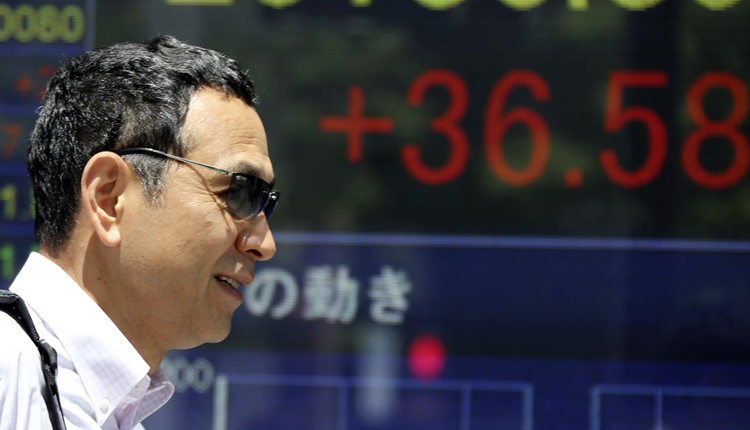Asian markets were trading in mixed territory Monday morning as investors remained cautious following fresh developments in the ongoing tensions between the United States and China.
The Chinese markets, which have been closely watched due to the trade fight between Washington and Beijing, were mixed by the end of the morning session.
The Shanghai composite saw gains of 0.22 percent while the Shenzhen composite slipped 0.267 percent. Meanwhile, Hong Kong’s Hang Seng index advanced 0.41 percent.
Elsewhere in Asia, Japan’s Nikkei 225 rose 0.47 percent in afternoon trade while the Topix index saw gains of 0.22 percent.
The positive moves followed trade data that showed the country’s exports rising 8.2 percent in October from a year earlier, reversing the decline seen in September. Still, the October number came below expectations of a 9 percent rise from economists polled by Reuters.
South Korea’s Kospi was near flat, while Australia’s benchmark ASX 200 slipped 0.58 percent in afternoon trade, with most sectors seeing losses. Energy stocks fell 1.49 percent while the heavily weighted financial subindex was down 0.91 percent.
Shares of newspaper publisher Fairfax Media bucked the overall trend to rise 2.44 percent after the company’s chairman, Nick Falloon, said that the proposed merger with television network Nine Entertainment received “overwhelming support from shareholders.”
Nine Entertainment shares rose 2.3 percent.
US and China spar over vision for Pacific
Competition between the U.S. and China over the Pacific was thrown into the spotlight at the Asia-Pacific Economic Cooperation summit in Papua New Guinea.
U.S. Vice President Mike Pence listed U.S. differences with China, a day after he directly criticized its Belt and Road programme, saying countries should not accept debt that compromised their sovereignty.
“They begin with trade practices, with tariffs and quotas, forced technology transfers, the theft of intellectual property. It goes beyond that to freedom of navigation in the seas, concerns about human rights,” Pence told reporters travelling with him, according to Reuters.
China’s foreign ministry responded by saying no developing country would fall into a debt trap simply because of its cooperation with Beijing.
The developments come ahead of an expected meeting between U.S President Donald Trump and his Chinese counterpart Xi Jinping at the upcoming G-20 summit in Buenos Aires, Argentina.
One strategist told CNBC’s “Squawk Box” that there was a “fundamental disagreement” between the way the U.S. and Chinese economic systems operated.
“The U.S. is preoccupied with trade deficits, China is more concerned about its long-term drivers of economic growth,” said Hannah Anderson, global market strategist at J.P. Morgan Asset Management on Monday.
She added that if policy makers on both sides “find some way to merge some reduction in the trade deficit with China being able to maintain its current industrial policy,” there could be “potential avenues” for the economic powerhouses to work together.
Nevertheless, Anderson said: “I’m not particularly optimistic that either side is going to get there in the next six months to maybe even a year.”
May defends her leadership
British Prime Minister Theresa May said on Sunday that the number of letters required to trigger a no-confidence vote in the Parliament had not been met and a change in leadership will only delay Brexit.
If enough members of parliament from May’s own party back a no-confidence vote, there will be a leadership contest and the prime minister would need more than 50 percent of the vote to stay in office.
May also said that a second referendum is not in the cards.
Last week, a flurry of ministers resigned from their positions in protest at May’s draft Brexit agreement. Their resignations came after May said she had obtained enough support from her senior ministers for the proposal to move forward.
The British pound traded at $1.2833 Monday afternoon during Asian hours, after falling from levels above $1.30 in the previous week.
Currencies
The U.S. dollar index, which tracks the greenback against a basket of its peers, was at 96.488 after last Friday’s fall from the 97 handle.
The Japanese yen, widely viewed as a safe-haven currency, was at 112.71 against the dollar after seeing lows above 114.1 last week. The Australian dollar traded at $0.7311 after rising from the $0.725 handle last Friday.
“We anticipate exchange rates will be largely directionless, and simply range‑trade on international political developments, particularly those coming from the U.K. concerning Brexit, and in the Eurozone, on Italian – EU budget issues,” Richard Grace, chief currency strategist and head of international economics at Commonwealth Bank of Australia, said in a morning note.
Source: CNBC


